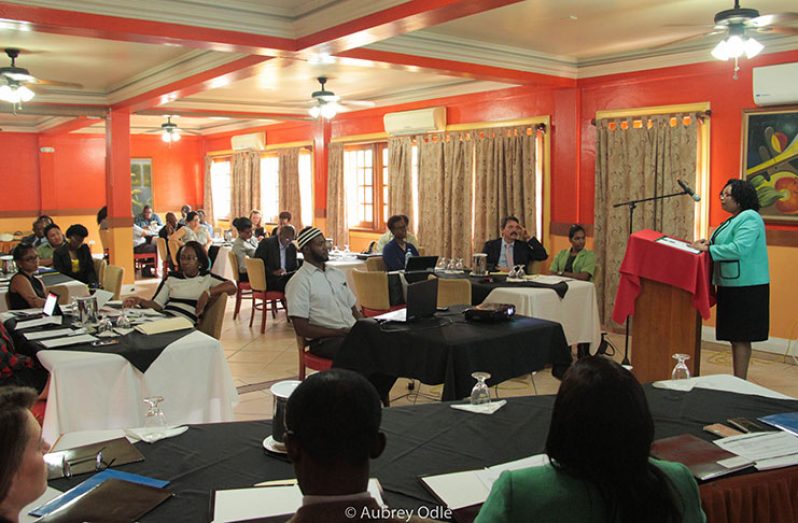PUBLIC Health Minister Volda Lawrence on Thursday plugged sustained local and international support to guarantee the success of the five-year US$8M Inter-American Development Bank (IDB) backing to fund the Maternal and Child Health Improvement Project she launched.
Lawrence is worried about Guyana’s continued high rates of maternal and infant mortality and said reversing those trends cannot be the sole responsibility of her ministry, her ministry said in a release. “The health sector, you and I know, is faced with a myriad of challenges at all levels and in varying degrees with our maternal and infant mortality appearing high on that list; our maternal mortality rates [are] estimated at 121/100,000 live births and infant mortality rates [are] estimated at 22/1000 live births,” Lawrence reminded specialist participants at the Grand Coastal Inn, Le Ressouvenir, East Coast Demerara.
The IDB, PAHO/WHO, USAID, UNICEF and the UN Population Fund (UNFPA) have stood out as major partners backing the local public health sector in the last decade “supporting health initiatives aimed at enhancing the delivery of primary health care to our people,” Lawrence said.
Nevertheless, the health sector challenges have remained daunting, Lawrence noted, highlighting the “proposed interventions of the bank in this particular initiative with the Maternal and Child Health Unit (MCH), which is beset by problems involving inadequate access, use [and] quality of reproductive maternal and neonatal health services.”
“At present, there exist countless constraints that militate against the effective operations of this unit and result in the demise of our mothers and infants. This phenomenon, I want to reiterate, undermines our national health priorities and depletes our national human resource assets,” the minister said.
“The US$8M IDB support will boost this sector and make a significant difference in the lives Guyanese mothers and their offspring and will be used to strengthen reproductive, maternal and neonatal health; strengthen the healthcare network and invest in administration and evaluation,” Dr Ertenisa Hamilton, MCH Director (ag) told participants.
“We, in the ministry, welcome this technical support, since we envisage that capacity-building will be engendered, resulting in the strengthening of the organisation of the health care network, enhancing the efficacy and effectiveness of our maternal, perinatal and neonatal units and ultimately reducing the number of maternal and infant deaths in our communities and regions,” Lawrence said, building on Dr. Hamilton’s disclosures.
The health sector improvement plan must be three-pronged Lawrence counselled, focusing on the structure or context, the process and the outcomes of this sector, “all of which are closely integrated” which in the end should bring down the maternal, perinatal and neonatal death rates.
Local figures have indicated that some 95 per cent of Guyanese depend on the public health sector which is funded from the national purse. Despite progress in the sector over the years, Guyana’s maternal infant mortality rates remain among the highest in Latin America and the Caribbean areas.
The IDB-backed initiative will support an in-depth revision of all guidelines, protocols, and strategies related to health of women of reproductive age, pregnancy, delivery, emergency care, and postpartum challenges. The programme also envisages a focus on specific needs of adolescents, men and indigenous peoples.
The project also intends to provide quality reproductive, maternal and neonatal care; strengthen the supply chain for contraceptive methods and drugs and blood products; and all processes relating to planning, procurement, storage, distribution, monitoring and evaluation, new management practices will become time-sensitive. The bank’s financial help will also fund improved collection, systemitisation, reporting and use of generated data to improve the quality of health information.
None of the interventions of the health improvement programme must “trample on the cultural beliefs and practices” of beneficiaries, Lawrence counselled, adding that we have to respect women’s rights and devise ways of promoting the implementation of patient-centred and culturally appropriate care, ensuring that women and their families are empowered, and are treated with respect.
“The health of our nation is a priority. It is most opportune for the citizens of this country to become recipients of a safe and well-structured Maternal and Child Health Department in each of the communities, so that referrals to GPHC are minimised for low-risk births and each community, district, facility can boast of quality care in the service of delivery of MCH. It is my hope that through this project, and our collaborative efforts, we can change attitudes and lifestyles in our residents and thereby create a climate of health consciousness and well-being,” Lawrence said.
Health Ministry launches $1.6B maternal and child health project
SHARE THIS ARTICLE :
Facebook
Twitter
WhatsApp




.png)









